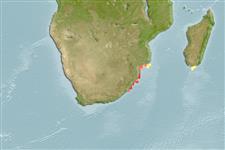Environment: milieu / climate zone / depth range / distribution range
экология
морской ассоциированный с рифами; пределы глубины 20 - 50 m (Ref. 4319). Subtropical; 25°S - 33°S, 30°E - 46°E (Ref. 5222)
Western Indian Ocean: known only from Madagascar, Natal in South Africa, and southern Mozambique.
Size / Вес / Возраст
Maturity: Lm ? range ? - ? cm
Max length : 100.0 cm TL самец/пол неопределен; (Ref. 4319); наибольший вес (опубликованные данные): 10.0 kg (Ref. 4319)
колючие лучи спинного плавника (общее число) : 11; членистые (мягкие) лучи спинного плавника (общее число) : 15 - 16; колючие лучи анального плавника: 3; членистые (мягкие) лучи анального плавника: 9. Distinguished by the following characteristics: body color dark reddish brown; head and body covered with small, irregular, close-set, dark red or reddish brown spots, pale interspaces forming irregular pale network pattern; 4 narrow, irregular, oblique, pale bars running down and forward on body; paired fins generally darker than body; body depth contained 3.1-3.5 times in SL; body width 1.7-2.0 times in depth; head length 2.3-2.4 times in SL; interorbital width 5.9-6.8 times in HL; concave interorbital area; rounded preopercle, finely serrate, shallow indentation just above angle; upper edge of operculum almost straight; inconspicuous opercular spines; posterior and anterior nostrils subequal; maxilla not reaching past eye; front of upper jaw with a pair of large, curved, fixed canines and a pair of similar but slightly smaller canines at front of lower jaw; lateral part of lower jaws with an outer row of 8-9 slightly smaller fixed canines and an inner row of smaller , more slender depressible teeth (Ref. 89707).
Appears to be a rare species, but it is of some importance to South African sport fishers along the northern coast of Natal. Coral reef-associated species inhabiting depths of 20-50 m (Ref. 89707). Feeds on fishes and invertebrates (Ref. 89707). Testes of a 61 cm SL specimen contained a central lumen and numerous 'brown bodies' along the lateral edges of the gonadal lamellae.
Life cycle and mating behavior
Maturities | размножение | Spawnings | Egg(s) | Fecundities | личинки
Heemstra, P.C. and J.E. Randall, 1993. FAO Species Catalogue. Vol. 16. Groupers of the world (family Serranidae, subfamily Epinephelinae). An annotated and illustrated catalogue of the grouper, rockcod, hind, coral grouper and lyretail species known to date. Rome: FAO. FAO Fish. Synop. 125(16):382 p. (Ref. 5222)
Статус Красного Списка МСОП (Ref. 130435)
Угроза для людей
Harmless
Использование человеком
рыболовство: рыболовство как средство для существования; объект спортивного рыболовства: да
дополнительная информация
инструменты
Специальные отчеты
Скачать в формате XML
ресурсы в Интернет
Estimates based on models
Preferred temperature (Ref.
123201): 23.7 - 24.7, mean 24.2 °C (based on 4 cells).
Phylogenetic diversity index (Ref.
82804): PD
50 = 0.5000 [Uniqueness, from 0.5 = low to 2.0 = high].
Bayesian length-weight: a=0.01175 (0.00571 - 0.02419), b=3.04 (2.88 - 3.20), in cm total length, based on LWR estimates for this Genus-body shape (Ref.
93245).
Trophic level (Ref.
69278): 4.0 ±0.6 se; based on size and trophs of closest relatives
устойчивость к внешним воздействиям (Ref.
120179): очень низкий, минимальное время удвоения популяции более 14 лет (Preliminary K or Fecundity.).
Fishing Vulnerability (Ref.
59153): High vulnerability (60 of 100).
